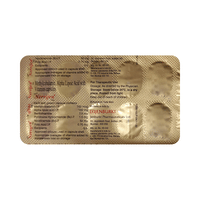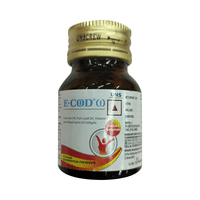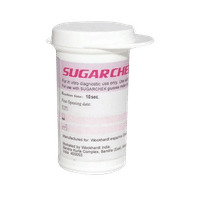food interaction for Semi-Amaryl Tablet
alcohol interaction for Semi-Amaryl Tablet
pregnancy interaction for Semi-Amaryl Tablet
lactation interaction for Semi-Amaryl Tablet
food
alcohol
pregnancy
lactation
Semi-Amaryl Tablet should be taken with or after food.
None
None
CAUTION
It is unsafe to consume alcohol with Semi-Amaryl Tablet
UNSAFE
The safety of Semi-Amaryl Tablet during pregnancy has not been established. There are no adequate and well-controlled studies in pregnant women, and animal data on reproductive toxicity are insufficient. Your doctor will weigh the benefits and any potential risks before prescribing.
CONSULT YOUR DOCTOR
Semi-Amaryl Tablet may be unsafe to use during breastfeeding. Limited human data suggests that the drug may pass into the breastmilk and harm the baby. It should be used only if the expected benefit outweighs the potential risk. Please consult your doctor.
Monitoring of the breastfed infant's blood glucose is advisable during maternal therapy with Semi-Amaryl Tablet
Monitoring of the breastfed infant's blood glucose is advisable during maternal therapy with Semi-Amaryl Tablet
CONSULT YOUR DOCTOR
SALT INFORMATION FOR Semi-Amaryl 0.5mg Tablet
Glimepiride(0.5mg)
Semi-amaryl tablet uses
{med_name} is used in the treatment of type 2 diabetes mellitus. It is used along with diet and exercise to improve blood sugar control in adults with type 2 diabetes.
How semi-amaryl tablet works
Semi-Amaryl Tablet is an antidiabetic medication. It works by increasing the amount of insulin released by the pancreas in order to lower blood glucose.
Common side effects of semi-amaryl tablet
Hypoglycemia (low blood glucose level), Headache, Nausea, Dizziness, Diarrhea, Weakness, Vasculitis, Hypersensitivity, Vomiting, Abdominal pain, Abnormal liver function tests, Blood cell abnormalities, Hemolytic anemia, Decreased blood cells (red cells, white cells, and platelets)
SUBSTITUTES FOR Semi-Amaryl Tablet
7 Substitutes
7 Substitutes
Sorted By
 Rs. 68.58pay 25% more per Tablet
Rs. 68.58pay 25% more per Tablet Rs. 124.69pay 54% more per Tablet
Rs. 124.69pay 54% more per Tablet Rs. 56pay 2% more per Tablet
Rs. 56pay 2% more per Tablet Rs. 23.72save 57% more per Tablet
Rs. 23.72save 57% more per Tablet Rs. 140.63save 15% more per Tablet
Rs. 140.63save 15% more per Tablet
Expert advice FOR Semi-Amaryl Tablet
- Take Glimepiride shortly before or with the first main meal of the day (usually breakfast).
- Exercise regularly, eat a healthy diet and take your other diabetes medicines (if prescribed) alongside.
- Monitor your blood sugar level regularly while you are taking Glimepiride.
- Glimepiride can cause hypoglycemia (low blood sugar level) when used with other antidiabetic medicines, alcohol or if you delay or miss a meal.
- Be careful while driving or operating machinery until you know how Glimepiride affects you.
- Always carry some sugary food or fruit juice with you in case you experience hypoglycemic symptoms such as cold sweats, cool pale skin, tremor and anxiety.
- Your doctor may check your liver function regularly. Inform your doctor if you develop symptoms, such as abdominal pain, loss of appetite, or yellowing of the eyes or skin (jaundice).
Frequently asked questions FOR Semi-Amaryl 0.5mg Tablet
Glimepiride
Q. What is the dosage of Semi-Amaryl Tablet?
The recommended starting dose of Semi-Amaryl Tablet is 1 mg or 2 mg once daily, administered with breakfast. If you are at a higher risk of low blood sugar (e.g., the elderly or patients with renal impairment), you will be given a starting dose of 1 mg once daily. The usual maintenance dose is 1–4 mg once daily. The maximum recommended dose is 8 mg once daily. After reaching a daily dose of 2 mg, the dosage will be increased not more than 2 mg at 1- to 2-week intervals, based on your blood glucose level.
Q. Does Semi-Amaryl Tablet make you sleepy?
Semi-Amaryl Tablet itself does not cause sleepiness. However, it may cause hypoglycemia (low blood sugar) when used with other anti-diabetes medicine. Because of this you may feel sleepy or have problems in sleeping.
Q. Is Semi-Amaryl Tablet safe for kidneys?
Semi-Amaryl Tablet does not affect kidneys in patients with normal kidney function. However, its use should be avoided in patients with severe kidney disease since Semi-Amaryl Tablet is principally eliminated by the kidneys.























